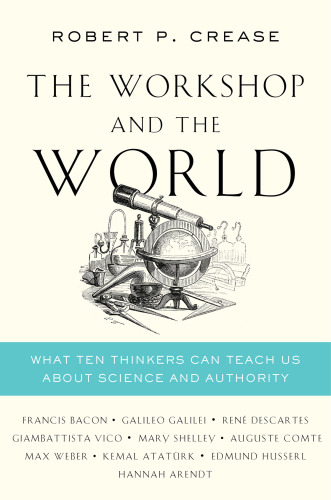
The Workshop and the World
What Ten Thinkers Can Teach Us About Science and Authority
کتاب های مرتبط
- اطلاعات
- نقد و بررسی
- دیدگاه کاربران
نقد و بررسی

November 1, 2018
At a time when science is ignored, dismissed, and even actively defied, we can all benefit from this study by Crease, chair of Stony Brook's philosophy department. Moving from the challenge tossed at the all-powerful Church by Bacon, Galileo, and Descartes to Atatürk's and Arendt's connection of science to the public at large, Crease shows us what key thinkers have shaped our understanding of science and when and how scientific discoveries become accepted--ultimately exploring the role of authority in our lives.
Copyright 2018 Library Journal, LLC Used with permission.

November 15, 2018
A timely, sophisticated analysis of the plague of science denial, and possible correctives, via an examination of the ideas of 10 profound thinkers.Crease (Chair, Philosophy/Stony Brook Univ.; World in the Balance: The Historic Quest for an Absolute System of Measurement, 2011, etc.) explores the work of individuals who "confronted severe problems with scientific authority in their time, reacted with different forms of anger, and took action. Some risked their lives. Taken together, their stories show why the dwindling authority of science is...threatening to human life." He finds that the vulnerabilities of science authority, at least in the eyes of detractors, derive from its own strengths. Crease deciphers the precepts of famous historical figures--Francis Bacon, Galileo, René Descartes, Mary Shelley, Max Weber, and Hannah Arendt--as well as well-known but noted intellectuals (Edmund Husserl, Auguste Comte, Giambattista Vico) to reveal how the modern scientific apparatus emerged, took shape, overcame resistance, and developed a once-pervasive authority. This author not only challenged--and still challenges--prevailing power structures and modes of thought, but also presented a philosophical quandary: how to reconcile scientific abstractions with the nonscientist's experiential grasp of the world. Crease, also a columnist for Physics World, is not simply a successful science popularizer, but also a perceptive critic, which is not to say he does not allow his political and ecological convictions to enter the equation, especially when it comes to science denial among opportunistic politicians. Given the range and complexity of the subject, the author has taken on a herculean task and executed it deftly. The narrative is stimulating, morally aware, and imbued with obvious respect for the men and women whose ideas the author plumbs. Refreshingly, Crease brings the same intellectual honesty to dissecting their flaws and mistakes as he does to appreciating their triumphs.Crease conveys in unambiguous terms the perils science denial presents to contemporary society and the importance of restoring the reputation of science as integral to a vibrant and enduring human culture.
COPYRIGHT(2018) Kirkus Reviews, ALL RIGHTS RESERVED.

























دیدگاه کاربران